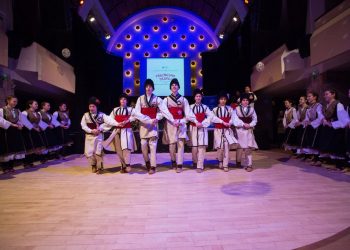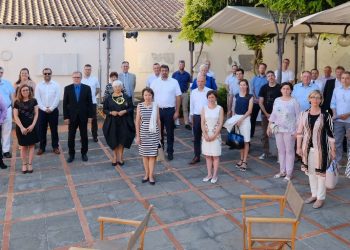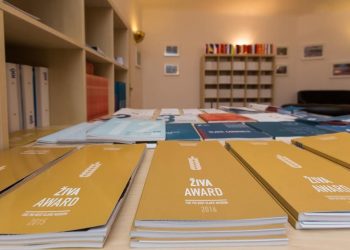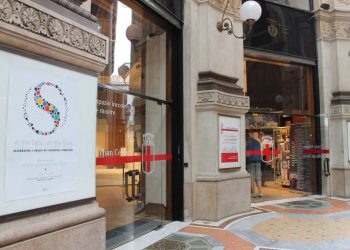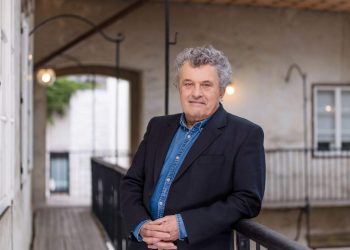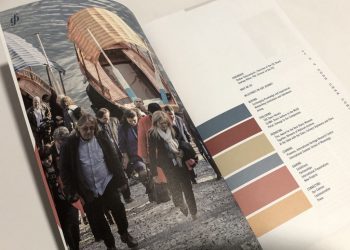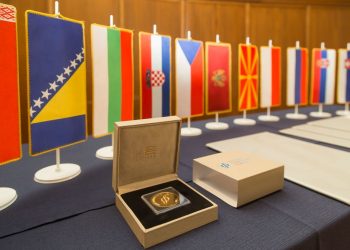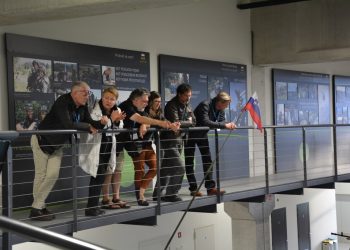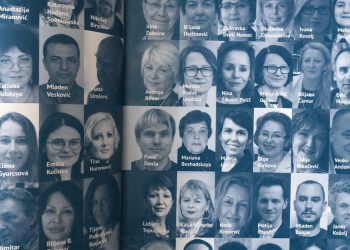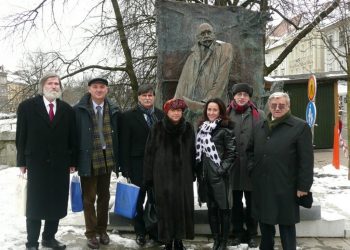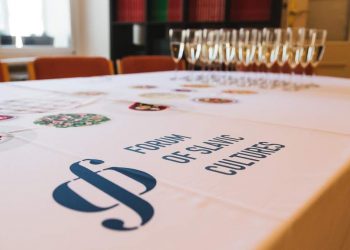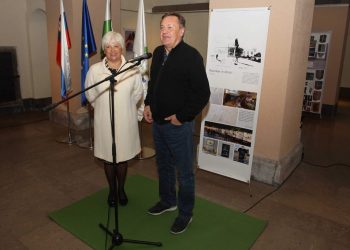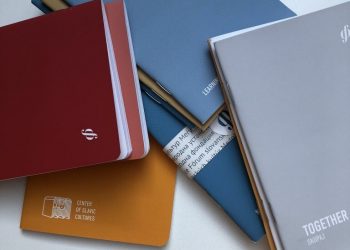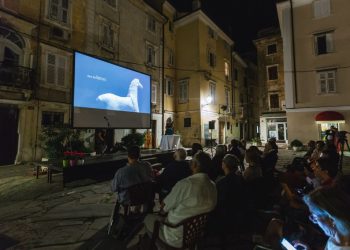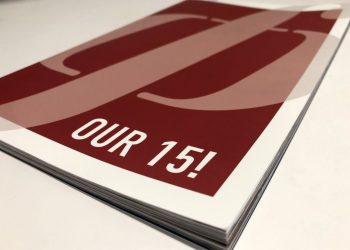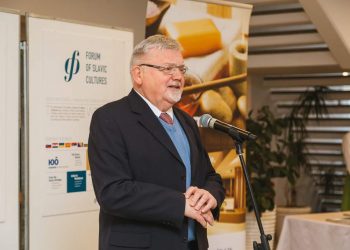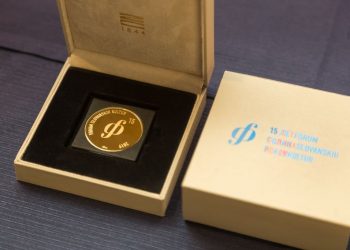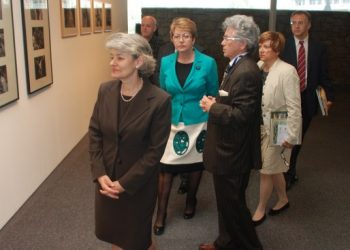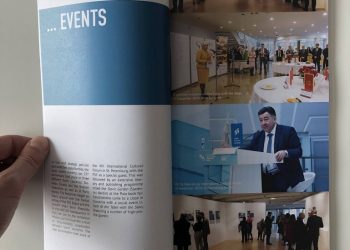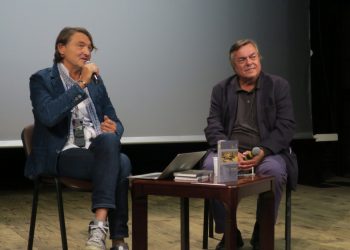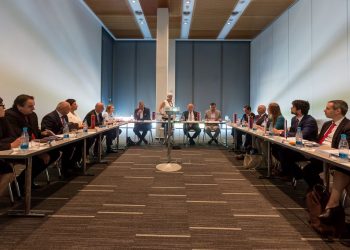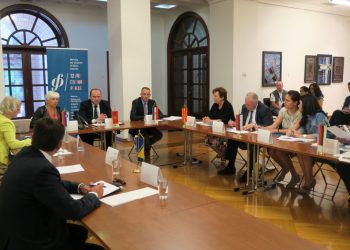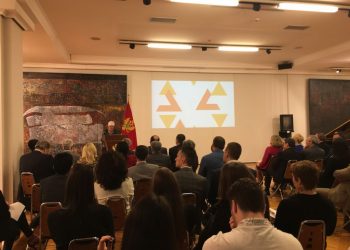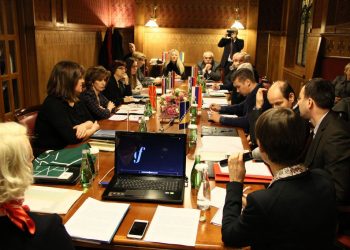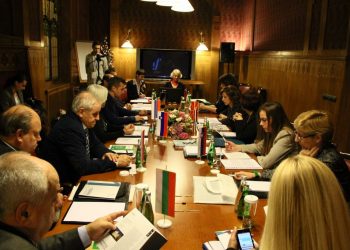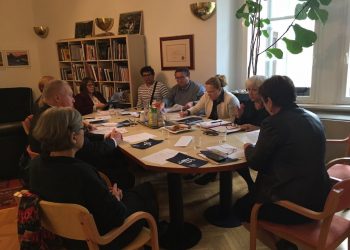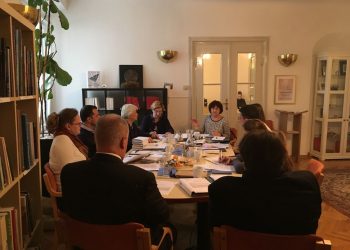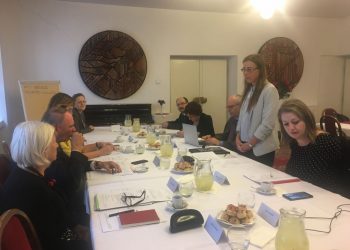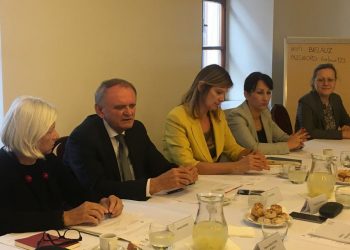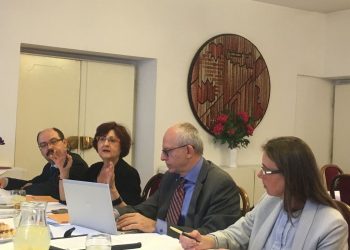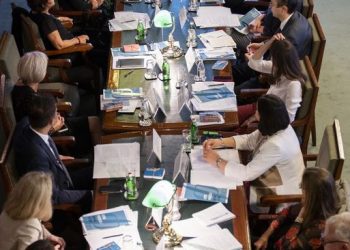За hас
Форумот на словенски култури (ФСК) е меѓународна непрофитна институција која работи во јавен интерес и за која идејата се роди во културното милје на почетокот на 21-иот век. ФСК официјално е основана во 2004 година и денес обединува повеќе од 300 милиони Словени во тринаесет словенски земји: Белорусија, Бугарија, Босна и Херцеговина, Чешка, Црна Гора, Хрватска, Северна Македонија, Полска, Руската Федерација, Словачка, Словенија и Србија и Украина.
МИСИЈА
Мисијата на ФСК е да ја оживее креативноста на словенските култури. Основна цел на институцијата е да го поврзе словенското културно милје и да го претстави во современ глобален социјален контекст.
Форумот на словенските култури ги поврзува и претставува словенската култура, наука и уметност, нејзиниот творечки набој и културно наследство и активно се грижи за препознатливиот придонес на словенските култури во глобалниот дијалог.
ЛИЧНИ ПОДАТОЦИ
Назив: Меѓународна фондација – Форум на словенските култури
Скратено име: ФСК – Форум на словенските култури
Адреса: Улица 27 април 47, 1000 Љубљана, Словенија
Tелефон: +386 (0)8 205 28 00
Факс: +386 (0)1 256 57 38
E-адреса: info@fsk.si
Веб-страница: https://www.fsk.si
Работно време: секоја среда меѓу 10 и 13 часот
ID за ДДВ: SI 11734086
Матичен број: 2035618
IBAN: SI56 2900 0005 0604 466 (УниКредит Банка Словенија, а.д., Шмартинска 140, 1000 Љубљана, Словенија; SWIFT / BIC: BACXSI22)
ОСНОВНИ ДОКУМЕНТИ
ОРГАНИ НА ФСК
Претседател на Управниот одбор на ФСК:
Маја Гојковиќ, вицепремиер и министер за култура и информации на Република Србија
Членови
- Боил Банов, Министер за култура на Република Бугарија
- Весна Братиќ, Министерка за образование, наука, култура и спорт на Република Црна Гора
- Олга Љубимова, Министерка за култура на Руската Федерација
- Нина Обуљен Коржинек, Министерка за култура на Република Хрватска
- Ирена Стефоска, Министерка за култура на Република Северна Македонија
и претставници на државите набљудувачи.
Претседател: Младен Весковиќ / Србија
Членови:
- Гојко Божовиќ / Србија
- Дубравка Џуриќ Немец / Хрватска
- Анатоли Крејдич / Белорусија
- Томислав Османли / Северна Македонија
- Милорад Поповиќ / Црна Гора
- Јулија A. Созина / Руска Федерација
Мирослава Валова / Словачка
Членови:
- Александар Арсовски / Северна Македонија
- Матеа Брстило Решетар / Хрватска
- Емилиа Лачна / Словачка
- Вера Лубуриќ / Црна Гора
- Аида Шабановиќ / Босна и Херцеговина*
- Огњан Тодоров / Бугарија
- Мирослава Турковиќ / Србија
Претседател на Управниот одбор на ФСК:
Маја Гојковиќ, вицепремиер и министер за култура и информации на Република Србија
Членови
- Боил Банов, Министер за култура на Република Бугарија
- Весна Братиќ, Министерка за образование, наука, култура и спорт на Република Црна Гора
- Олга Љубимова, Министерка за култура на Руската Федерација
- Нина Обуљен Коржинек, Министерка за култура на Република Хрватска
- Ирена Стефоска, Министерка за култура на Република Северна Македонија
и претставници на државите набљудувачи.
Претседател:
Дубравка Џуриќ Немец / Хрватска
Членови:
- Стојанка Атанасова / Бугарија
- Андрија Радуловиќ / Црна Гора
- Тања Џаковиќ / Босна и Херцеговина*
- Вадим Дуда / Руска Федерација
- Татјана Краљевска Лазарова / Северна Македонија
- Перина Меиќ / Босна и Херцеговина*
- Петар Миладинов / Бугарија
- Гордан Николов / Северна Македонија
- Јулија А. Созина / Руска Федерација
- Билјана Туџаровска Ќупева / Северна Македонија
- Младен Весковиќ / Србија
и претставници на државите набљудувачи:
- Вероника Фалтова / Чешка
- Мирослав Кана / Словачка
- Викториа Ратобилска / Белорусија
- Војтеч Мерунка / Чешка
*во мирување
Претседател: Младен Весковиќ / Србија
Членови:
- Гојко Божовиќ / Србија
- Дубравка Џуриќ Немец / Хрватска
- Анатоли Крејдич / Белорусија
- Томислав Османли / Северна Македонија
- Милорад Поповиќ / Црна Гора
- Јулија A. Созина / Руска Федерација
Мирослава Валова / Словачка
Членови:
- Александар Арсовски / Северна Македонија
- Матеа Брстило Решетар / Хрватска
- Емилиа Лачна / Словачка
- Вера Лубуриќ / Црна Гора
- Аида Шабановиќ / Босна и Херцеговина*
- Огњан Тодоров / Бугарија
- Мирослава Турковиќ / Србија
ФСК држави
ГЛАВНА КАНЦЕЛАРИЈА НА ФСК
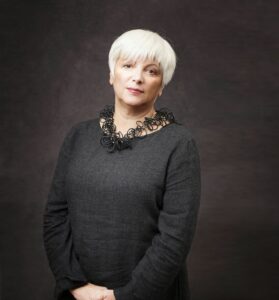
Andreja Rihter, PhD,
Director
E: andreja.rihter@fsk.si
Andreja Rihter was the first President of the Board of the International Foundation– Forum of Slavic Cultures (FSK), serving two terms of office, from its inception in 2004 until 2006 and again from 2008 until 2012, when she was appointed Director of the FSK. She continues to serve as FSK Director today. She is the author of FSK’s first project 100 Slavic Novels, initiator of ŽIVA Award for the best Slavic museum and of the newly developed cultural route project Women Writers Route (WWR) as well as the inceptor of diverse international collaborations between Slavic speaking countries and beyond.
There is an amazing, and growing number of Slavic museums and heritage sites which extend their role in society with a significant local or national impact. That is admirable in itself, but these experiences need to be shared, seen and acknowledged. And the Živa Award – with all its applicants – is a major entrance point for the FSK stakeholders, colleagues and audiences.
The Award serves as a platform for sharing and promoting – in Slavic countries as well as in the broader group of European countries. Both main awards (The Živa Award for the
Best Slavic Museum and the Živa Award for the Best Slavic Heritage Site) are dedicated to the promotion of the protection, preservation, education and communication of museum collections, and of heritage sites, their diversity in type, size and contents as well as their social role by highlighting their innovative and creative approaches, accessibility to the public and openness, their impact on societies, and their contribution to the development of museological principles and ideas.
She obtained her PhD in 2016 with the doctoral dissertation “Heritage of Socialism between Memory and Oblivion” at the Faculty of Arts, University of Ljubljana, after having obtained her master’s degree at the same university in 2008 with her master’s thesis “Development of Tourism in Interwar Celje”.
With a degree in history Andreja Rihter embarked on her professional career in 1981 as a curator at the Museum of Recent History Celje and became its director in 1987.
In 2004, when Slovenia joined the EU, she became the Minister of Culture of the Republic of Slovenia, serving a full term of office. She accumulated more political experience as a Member of Parliament of the Republic of Slovenia between 2008 and 2011. In the same period she was a member of the Parliamentary Assembly of the Council of Europe (2009 – 2011) and President of the Sub-Committee on Cultural Heritage of the Committee on Culture, Science and Sport (2010 – 2011) at the Parliamentary Assembly.
Throughout her career, she has always focused on cultural heritage, history and related activities at the national and international level. In 1991 she became member of the ICOM (International Council of Museums based in Paris) and currently serves as Secretary at the ICOMAM Executive Board (she has been a member of ICOMAM Executive Board since 2016). Upon the founding of the Netherlands-based NGO the European Museum Academy (EMA) in 2009 she became its president and still continues to serve in this capacity. She is also on the panel of judges for the European Museum Awards conferred by the EMA in cooperation with the Micheletti Foundation.
She served as Vice-President of Hands On! – International Association of Children in Museums (2009 – 2019), member of the Board of Directors (2009 – 2015), and currently performs the role of national correspondent.
Before that, in the 1990s, she was very active in Slovenia. She was President of the Museum Association of Slovenia (1998 – 2001), initiator and founder of the School of Museology in Celje (2006) as well as President of the Celje Tourist Association, the oldest tourist association in Slovenia (1997 – 1999).
Andreja Rihter is author of more than 240 scientific, professional and general-interest articles as well as editor of a number of books and catalogues. She regularly attends and organises conferences, roundtables and consultations in Slovenia and abroad.
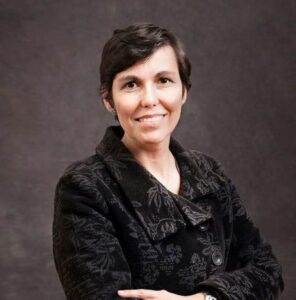
Mateja Jančar
Project Manager
E: mateja.jancar@fsk.si
She graduated in Comparative Literature and Literary Theory and English Language and Literature at the University of Ljubljana. She worked as translator, editor, script writer, PR officer, manager and dramaturg. So far, she has translated nine books and numerous articles, short stories, essays and films. She has experience in project and programme management, organization, publishing, translating and linguistics, and international co-operation.
There is an amazing, and growing number of Slavic museums and heritage sites which extend their role in society with a significant local or national impact. That is admirable in itself, but these experiences need to be shared, seen and acknowledged. And the Živa Award – with all its applicants – is a major entrance point for the FSK stakeholders, colleagues and audiences.
The Award serves as a platform for sharing and promoting – in Slavic countries as well as in the broader group of European countries. Both main awards (The Živa Award for the
Best Slavic Museum and the Živa Award for the Best Slavic Heritage Site) are dedicated to the promotion of the protection, preservation, education and communication of museum collections, and of heritage sites, their diversity in type, size and contents as well as their social role by highlighting their innovative and creative approaches, accessibility to the public and openness, their impact on societies, and their contribution to the development of museological principles and ideas.
Currently she works as a project manager at the International Foundation – Forum of Slavic Cultures; her chief responsibility is the foundation’s literary, publishing and translation programmes. She is also coordinator and Slovenian editor of the 100 Slavic novels series and coordinates the establishment of the new cultural route – Women Writers Route. All project she works on are international and include constant communication in different languages, co-ordination and work in international environment.
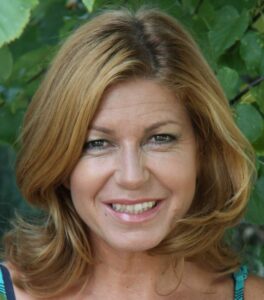
Špela Bogataj
Business Secretary
E: info@fsk.si
After High School of Design and Photography in Ljubljana Špela attended a professional qualification course at Educational Centre Miklošič to become a business secretary. Her first work experience was in a photo studio. She went on to work as a business secretary at the company Arcadia Lightwear, where she helped organise exhibitions and lectures for students and architects.
There is an amazing, and growing number of Slavic museums and heritage sites which extend their role in society with a significant local or national impact. That is admirable in itself, but these experiences need to be shared, seen and acknowledged. And the Živa Award – with all its applicants – is a major entrance point for the FSK stakeholders, colleagues and audiences.
The Award serves as a platform for sharing and promoting – in Slavic countries as well as in the broader group of European countries. Both main awards (The Živa Award for the
Best Slavic Museum and the Živa Award for the Best Slavic Heritage Site) are dedicated to the promotion of the protection, preservation, education and communication of museum collections, and of heritage sites, their diversity in type, size and contents as well as their social role by highlighting their innovative and creative approaches, accessibility to the public and openness, their impact on societies, and their contribution to the development of museological principles and ideas.
She gained experience in working with people, in the field and in the studio, when she joined a casting agency, where she was also in charge of the standard administrative tasks. The next step in her career was opening her own shop with kids’ textiles and accessories, through which she gained extensive experience and knowledge in how to run a business. Throughout her career she developed her business communication skills, and her knowledge of English and Italian helped her to effectively work in different environments. Today she works as a business secretary at the Forum of Slavic Cultures.
ИСТОРИЈА НА ФСК
Форумот на словенските култури (ФСК) е непрофитна и невладина институција што ги поврзува Бугарија, Босна и Херцеговина, Хрватска, Северна Македонија, Полска, Русија, Србија, Црна Гора, Словенија, Белорусија, Словачка, Украина и Чешка во меѓународна организациска структура. За време на своето работење од 2004 година, ФСК стана промотор на активен меѓукултурен дијалог меѓу словенските земји.
Иницијативата за формирање на Форум за словенски култури (ФСК) се случи во 2002 година. Поширока почетна точка за воспоставување беа современите процеси на глобализација и фактот дека словенските земји влегоа во Европската унија. Во декември истата година, на иницијатива на словенечкиот министер за култура, министрите за култура на земјите чии жители зборуваат словенски јазици се состанаа неформално во Брдо крај Крањ во Словенија. По долгите прелиминарни подготовки и договори, тие изготвија заедничка изјава дека земјите треба да ја зајакнат и охрабрат меѓусебната соработка во областа на културата во нејзина најширока смисла и да ја забрзаат соработката во европските и другите меѓународни организации во рамките на Форумот на словенските култури, што треба да се заснова во Љубљана. Меѓународната фондација Форум на словенските култури е основана во 2004 година од страна на Владата на Република Словенија. Членовите на првиот управен одбор на ФСК беа назначени од Словенија, Бугарија, Босна и Херцеговина, Хрватска, Северна Македонија, Полска, Русија и Србија и Црна Гора. Инаугуративната седница на Управниот одбор на ФСК се одржа на 29 јуни 2004 година во Љубљана. Инаугуративната седница на Програмскиот одбор на ФСК се одржа исто така во Љубљана на 20-ти и 21-ви март 2006 година.
Првично, институцијата постави две долгорочни цели:
- Поттикнување на развојот на културна соработка помеѓу сите земји чии жители зборуваат словенски јазици. Преку размена на информации и знаење и дисеминација на истите директно до јавноста може да се придонесе до подобро меѓусебно познавање на земјите-учеснички.
- Поттикнување на развој на културната соработка помеѓу сите земји низ целиот свет. Словенските култури да бидат препознатливи и привлечни надвор од јазичните граници на словенските земји. Придонес до поголем интерес и подобро разбирање на светот, особено во рамките на ЕУ и другите јазични области на светот.
Од самиот почеток, фондацијата промовираше културна соработка, заемно запознавање и дијалог меѓу културните фигури на словенските земји, засновани на еднакво учество и не само на јазичниот национализам, што беше целта на панславизмот. ФСК ги зајакнува активностите за соработка во областа на уметноста, литературата, образованието и истражувањето.
Важен фактор во формирањето на сопствена национална култура е реализацијата на она што ја одделува од другите, иако прилично поврзани, култури. Ако гледаме на сопствената култура како изолирана, неповторлива појава, тогаш нема потреба да продолжиме да се развиваме, збогатуваме и да се гордееме со тоа пред другите – културните ексцеси се случуваат само кога ќе ја одделиме нашата култура од другите. Но, ние прво мора добро да ги познаваме другите култури и да им дозволиме да го надминат нашиот културен праг, бидејќи само со спојување на различните култури навистина ќе ја разбереме и правилно ќе ја процениме сопствената посебност.
Поради својата геополитичка позиција, Словенија е „природен“ иницијатор на таквата поврзаност – поврзаност на земјите во кои зборуваме словенски јазици. Се наоѓа на западниот раб на словенскиот свет и истовремено е членка на ЕУ. Заедно со нејзиниот интерес за сопствената култура и идентитет, носи пошироки обединувачки интереси на ЕУ, што значи подигнување на нејзиниот углед и зајакнување на нејзината моќ во меѓународната заедница. Улогата и иницијативата на Словенија е обединувачка и се заснова на рамноправно партнерство на сите учесници. Културата и уметничката продукција на словенските земји оставија забележителни достигнувања и опипливи траги на глобално ниво во историјата. Понекогаш се создава впечаток дека современата културна продукција или т.н. „Славјански исток“ е маргинален што сè уште не е интегриран во т.н. „Западниот свет“ на уметноста. Во ФСК, ние тврдиме дека креативните сили и уметничкиот потенцијал на земјите се поголеми отколку што може да се заклучи од нивното селективно присуство во западниот уметнички систем. Затоа, една од задачите на ФСК е да биде релевантна во прашањето за статусот на уметноста и културата во поширока смисла денес.
Во 2012 година, Фондацијата го усвои Стратешкиот план и со него ја редефинираше својата мисија: „ФСК ја оживува креативноста на словенските култури“; Главните активности на ФСК беа и сè уште се:
- промовирање на проток на културни информации од сите земји учеснички,
- промовирање на имплементација на заеднички проекти од областа на културата, науката и туризмот,
- воспоставување на програми за образување (во форма на стипендии)
- промовирање на мобилноста на уметниците помеѓу земјите учеснички,
- преземање иницијативи за културни проекти, размени или патувања од сите земји учеснички,
- подобрување на заедничкото истражување,
- промовирање на соработката во областа на лингвистиката, и општо славистиката, организирање конференции, семинари, колоквиуми и други состаноци.
На основањето на Меѓународната фондација – Форум на словенски култури, напишавме:
„Единствена/јасна цел на Меѓународната фондација – Форум на словенските култури не е само квалитетна поддршка за словенската соработка, туку и промена на социјалните услови за отворена и плодна креативност на словенските култури“.
По 16 години работење, сме среќни што откривме дека ја постигнуваме и понатаму градиме нашата цел.
Literary writing is an important constituent of national culture, as it has an added value that no other artistic discipline possesses: language, which German Romantic philosophers claimed was the primary source of national identity. It is also what our first project, the 100 Slavic Novels is all about: promoting and strengthening language and cultural exchange, which is even more challenging due to our linguistic kinship and joint “transition”. But the collection aims beyond promoting mutual understanding between Slavic nations, its goal is also to spread the word of the best of Slavic creativity among non-Slavic literature lovers. The project took off in 2006, when members, under the baton of Andreja Rihter, defined the basic parameters of cooperation at meetings in Belgrade in Ljubljana. In the same year, the book series received its visual identity. The first translations came out in Slovenia, Serbia, Slovakia and North Macedonia, and soon after also in Russia. Later they were joined by Belarus, Bolgaria, Croatia and Montenegro.
At the Forum of Slavic Cultures we have been actively involved also in a number of literary festivals: Slavic Bridge (Ljubljana, Strasbourg), Slavic Embrace (Varna – Bulgaria), Struga Poetry Evenings (Struga – Macedonia), Days of Poetry and Wine (Medana, Ptuj – Slovenia) and Stranou (Beroun – the Czech Republic), writers’ meetings at the Tolstoy estate Yasnaya Polyana, Fabula Festival (Ljubljana) and most recently also in the Slavic Garden at the Pula Book Fair(y) (Croatia, 2019). We presented our 100 Slavic Novels at several exhibitions across Europe; among the most notable was the exhibition at the UNESCO headquarters in Paris in 2016, when we celebrated its 10th anniversary. In nearly 15 years of our operation our book series has made an appearance at a number of events, including conferences, round tables, exhibitions and readings in Serbia (2015, 2016, 2017, 2018, 2019), Croatia (2018), England (2016), Germany (2018), Russia (2017, 2018, 2019), China (2016), Montenegro, North Macedonia (2014), the Czech Republic (2017), Slovakia (2018), Austria (2017), Brazil (SLAWA – 2015) and Slovenia (2016, 2017, 2018 PEN, 2019). Between 2010 – 2014 the FSK cooperated with the Public Fund for Cultural Activities in the mobility programme for artists, predominantly writers.
Upon its inception, the Forum of Slavic Cultures defined preservation and promotion of Slavic cultural heritage as one of the priorities of its mission, in particular in terms of ethnography, folklore studies, museology and archival science, highlighting as one of its goals the establishment of study programmes (scholarships) and exchange schemes for curators, restorers and similar, to promote mobility of experts between participating countries.
More systematic activities began in 2006, when the Programme Council adopted its heritage guidelines, but the first concrete projects took place in 2011 when the heritage project group met for the first time:
- preparation and organisation of the first joint exhibition My portrait for the museum, which opened in 2012 at the UNESCO headquarters in Paris. The project involved … institutions from … countries;
- we started preparations for the Živa Award for the best Slavic museum, which was conferred for the first time in Skopje in 2014.
… more - In 2012, in the framework of the Maribor – European Capital of Culture programme and in cooperation with the Assembly of the Council of Europe we organised the conference: The History of Socialism: Film and Technical Heritage.
- In 2006 we organised the first seminars on the training of museum professionals. The first seminar for directors of museums of North Macedonia was held in Ohrid, and was organised by Andreja Rihter with Massimo Negri (EMA) and the Ministry of Culture of North Macedonia. Our seminars continued in North Macedonia in cooperation with ICOM and the Museum of Macedonia, and in Serbia in collaboration with the Gallery of Matica Srpska and the Ministry of Culture. In Slovenia we were actively involved in organising instructional seminars in the framework of the International Summer School of Museology.
Individual educational projects of the International Summer School of Museology in Piran have grown considerably. Since 2018 they take place in the framework of Piranova, International Heritage Research Centre in Piran.
The FSK has been active in education for a number of years, in particular at the international summer school META Humanities, which is organised by the University of Primorska in Koper, and at the International Seminar of Slovenian Language, Literature and Culture, which is organised by the Centre for Slovene as the Second/Foreign Language.
We have been pursuing our primary goal, collaboration in joint projects within our respective countries, also in the framework of the project Together. The project connects state and national archives. This collaboration has generated a number of joint exhibitions, publications and conferences. The FSK co-organised the 1st conference of national archives of Slavic countries in Lipica in 2010 and at the initiative of the state archives began working towards their collaboration.
The first independent conference thus took place in 2015 in Ljubljana and focused on World War I. The second conference took place in Dubrovnik in 2016, in cooperation with Croatian State Archives and ICARUS Croatia. The third conference took place in Warsaw in 2017 in cooperation with the State Archives of Poland. Our collaborations take place also through joint exhibitions: Slavic Capitals in 2D, 2013, at the UNESCO headquarters in Paris, which travelled to Cetinje later the same year, and to Skopje, Belgrade and Sofia in 2014. The archives organised and put on the exhibition Women and the Great War at the UNESCO headquarters in Paris in 2019. The exhibition was opened by Saniye Gulser Corat, UNESCO’s director for gender equality.
Exhibitions are an especially prominent feature of our collaboration with museums and galleries. As early as in 2008, the FSK in collaboration with the Slovenian Ethnographic Museum, ZRC SAZU and the Russian Ethnographic Museum of St. Petersburg organised a very well-received ethnographic exhibition of national costumes in Brussels. The exhibition was accompanied with a film on DVD, Les Slaves de l’Europe by Naško Križnar (ZRC SAZU).
Another notable event was our exhibition of intangible heritage – Slavic Carnivals, which premiered in June 2014 at UNESCO’s headquarters in Paris. It featured 12 museums from 12 Slavic speaking countries and was accompanied with a catalogue. The exhibition opened on 3 June 2014 with inaugural addresses by Mechtild Rossler, Deputy Director of UNESCO’s Heritage Division, Hans Martin – Hinz, president of the International Council of Museums ICOM, Andreja Rihter, Director of the FSK and Bojana Roglej Škafar, Director of the Slovene Ethnographic Museum. In 2015, the exhibition travelled to Pazin/Croatia (Ethnographic Museum of Istria), Belgrade/Serbia (Ethnographic Museum), Banja Luka/Bosnia and Herzegovina (Museum of the Republic of Srpska) and Kotor/Montenegro (Maritime Museum). In 2016, the exhibition visited St. Petersburg/Russia, where it was on show at the Russian Ethnography Museum.
Another important exhibition was a double show World Heritage in the Slavic World (photography) and Slavs. Legends Past and Present (folklore) at the UNESCO headquarters in Paris in 2011. The same year we organised a one-off exhibition on one of the most important artefacts of the Slavic cultural heritage – the 11th-century Codex Suprasliensis, which took place in Brdo pri Kranju. The FSK also helped in the documentary film on the ethnologist and linguist Matija Majar-Ziljski Illusions Lost, we published a history monograph on meetings at the Russian Chapel on Vršič (2007) and the proceedings Slovenian Diplomats in the Slavic World (2010).
Our second goal was pursued through various activities: scientific symposia of the Slovenian Science Institute in Vienna Reformation in Central Europe (2008) and 1989-2009: Religion and a Shift in East and Southeast Europe (2009); we also make regular appearances at the UNESCO headquarters. In addition to said exhibitions we should point out the presentation of At the Table with the Slavs, the first world monograph on Slavic cuisines, in Milan (2015), Beijing (2016) and Jamtli, Sweden (2017). We cooperate with the Council of Europe – Assembly of the Council of Europe, and in the last three years also with the European Institute of Cultural Routes of the Council of Europe from Luxemburg.
The FSK gave the initiative for the association Women Writers’ at the Beginning of the 20th Century. Its goal is to devise and manage a cultural route dedicated to women writers, which will shed light on the history of human rights and democracy in Europe, present the extraordinary efforts of women writers in these processes and expand research into women’s writing in the context of European history, identity and values. Through inspiring presentations and dynamic cultural activities it will introduce the life and work of women writers to wider audiences, and strengthen and consolidate scientific, cultural and tourist exploration of women’s writing, the places that marked them and their lives. The route begins in our region and will extend across Europe.
Our last project is called Transformations – FROM the Slavic Clothing Tradition TO Contemporary Designs. Its aim is to bring together creative fashion efforts from our countries and present them to the world. We create and build a long-lasting umbrella platform of fashion creativity of Slavic countries for both the general and professional public in Slovenia and abroad.
ИЗВЕШТАИ И ПОЛИТИКА
Поради своето обврзување за поголема транспарентност и поголем пристап до информации од јавен карактер, ФСК со Вас ја споделува политиката на приватност и годишните извештаи.
FSK Annual Report 2019
FSK Annual Report 2017
FSK Our15!
FSK Annual Report 2016
FSK Annual Report 2015
Придружете ни се и искористете ги ексклузивните привилегии како што се бесплатен влез, специјални попусти и многу повеќе.

